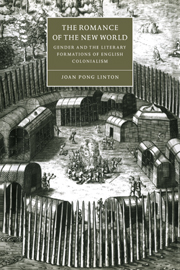Book contents
- Frontmatter
- Contents
- Acknowledgments
- Introduction
- 1 Love's laborers: the busy heroes of romance and empire
- 2 Sea-knights and royal virgins: American gold and its discontents in Lodge's A Margarite of America (1596)
- 3 Jack of Newbery and Drake in California: domestic and colonial narratives of English cloth and manhood
- 4 Eros and science: the discourses of magical consumerism
- 5 Gender, savagery, tobacco: marketplaces for consumption
- 6 Inconstancy: coming to Indians through Troilus and Cressida
- 7 The Tempest, “rape,” the art and smart of Virginian husbandry
- Coda: the masks of Pocahontas
- Notes
- Works cited
- Index
- Cambridge Studies in Renaissance Literature and Culture
1 - Love's laborers: the busy heroes of romance and empire
Published online by Cambridge University Press: 06 November 2009
- Frontmatter
- Contents
- Acknowledgments
- Introduction
- 1 Love's laborers: the busy heroes of romance and empire
- 2 Sea-knights and royal virgins: American gold and its discontents in Lodge's A Margarite of America (1596)
- 3 Jack of Newbery and Drake in California: domestic and colonial narratives of English cloth and manhood
- 4 Eros and science: the discourses of magical consumerism
- 5 Gender, savagery, tobacco: marketplaces for consumption
- 6 Inconstancy: coming to Indians through Troilus and Cressida
- 7 The Tempest, “rape,” the art and smart of Virginian husbandry
- Coda: the masks of Pocahontas
- Notes
- Works cited
- Index
- Cambridge Studies in Renaissance Literature and Culture
Summary
In 1573, George Gascoigne's “Adventures of Master F.J.,” a tale of courtly adultery between a married lady Elinor and a nobleman F.J., set in an estate in northern England, first appeared in a collection of verses entitled A Hundreth Sundrie Flowres. Although Gascoigne hoped to gain courtly preferment by his story, it offended influential members of both the court and the clergy, and was suppressed in 1574 amidst charges of libel and immorality. In response, Gascoigne revised the story: he invented an Italian source and setting, removed the offending passages, and moralized the ending. The revised “Adventures” appeared in another collection called The Posies (1575), in a section entitled “Weedes.” The story is preceded and thus framed by a poem featuring a certain Green Knight, an unrequited courtly lover who complains of lost labor and, bidding “farewell to Fansie,” departs from the court in search of gainful employment abroad. Unfortunately for Gascoigne, this second publication, too, was suppressed in 1576 when a passage unrelated to the story offended yet other courtly personages.
The suppression of offending works did not entirely remove them from social currency, however. Two decades later, William Warner was to redeem both Elinor's reputation and the Green Knight's fortunes in books eleven and twelve of Albions England (1596). Although Warner does not mention Gascoigne, the parallels in plot and character are too pointed to be merely coincidental. In Warner's story, the “Green Knight” is the disguise assumed at a tournament by Sir John Mandeville –a courtly and Protestant version of the medieval traveler – who is secretly in love with Elenor, sister of King Edward III.
- Type
- Chapter
- Information
- The Romance of the New WorldGender and the Literary Formations of English Colonialism, pp. 13 - 38Publisher: Cambridge University PressPrint publication year: 1998



